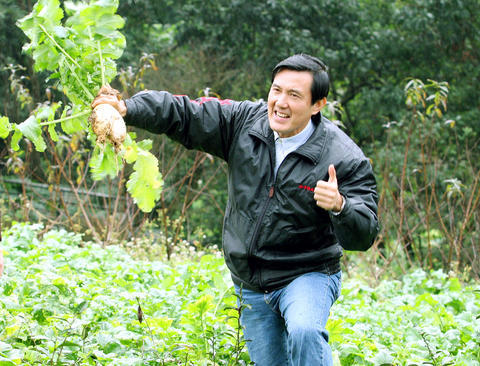Chinese Nationalist Party (KMT) presidential candidate Ma Ying-jeou (馬英九) unveiled his cultural policies yesterday, pledging to establish a Ministry of Culture and Tourism and to increase the budget for the cultural sector from 1.3 percent of the general budget to 4 percent if elected president.
Underscoring the need to enhance the nation's "soft power" through culture, Ma said that he would establish a consultation team on cultural affairs under the Cabinet and hold a presidential culture forum annually to ensure that the government is fully implementing its policies.
"Culture is a major source of soft power and we should use it as a key strategy for the country's development and competitiveness on the international stage, Ma said yesterday at a tea house in Maokong (貓空), Taipei City.

PHOTO: CNA
Ma proposed to merge the culture and tourism industries and has budged a NT$30 billion (US$900 million) fund for the development of local cultural and tourism industries.
He also promised to open airspace for light aircraft as well as to relax the regulations on coastal investments.
Acknowledging China's growing influence worldwide, Ma said Taiwan should push for cross-strait cultural exchanges to "export" Taiwanese culture and values to China by supporting cross-strait exchange student programs.
He said the nation should also join efforts with China to edit a "21st Century Chinese Dictionary" with both simplified and traditional Chinese versions to promote the language and the two cultures.
Ma further pledged to establish a Taiwan Film Center to cultivate more talent in the film industry and promote traditional arts, such as Peking Opera and puppet shows, internationally.
Ma also promised he would set up a "cultural diplomacy" fund -- with an initial budget of NT$5 billion -- to encourage more international students to study in Taiwan and attract more foreign artists and researchers to have cultural exchanges in Taiwan.

Taiwan would benefit from more integrated military strategies and deployments if the US and its allies treat the East China Sea, the Taiwan Strait and the South China Sea as a “single theater of operations,” a Taiwanese military expert said yesterday. Shen Ming-shih (沈明室), a researcher at the Institute for National Defense and Security Research, said he made the assessment after two Japanese military experts warned of emerging threats from China based on a drill conducted this month by the Chinese People’s Liberation Army’s (PLA) Eastern Theater Command. Japan Institute for National Fundamentals researcher Maki Nakagawa said the drill differed from the

‘WORSE THAN COMMUNISTS’: President William Lai has cracked down on his political enemies and has attempted to exterminate all opposition forces, the chairman said The legislature would motion for a presidential recall after May 20, Chinese Nationalist Party (KMT) Chairman Eric Chu (朱立倫) said yesterday at a protest themed “against green communists and dictatorship” in Taipei. Taiwan is supposed to be a peaceful homeland where people are united, but President William Lai (賴清德) has been polarizing and tearing apart society since his inauguration, Chu said. Lai must show his commitment to his job, otherwise a referendum could be initiated to recall him, he said. Democracy means the rule of the people, not the rule of the Democratic Progressive Party (DPP), but Lai has failed to fulfill his

A rally held by opposition parties yesterday demonstrates that Taiwan is a democratic country, President William Lai (賴清德) said yesterday, adding that if opposition parties really want to fight dictatorship, they should fight it on Tiananmen Square in Beijing. The Chinese Nationalist Party (KMT) held a protest with the theme “against green communists and dictatorship,” and was joined by the Taiwan People’s Party. Lai said the opposition parties are against what they called the “green communists,” but do not fight against the “Chinese communists,” adding that if they really want to fight dictatorship, they should go to the right place and face

A 79-year-old woman died today after being struck by a train at a level crossing in Taoyuan, police said. The woman, identified by her surname Wang (王), crossed the tracks even though the barriers were down in Jhongli District’s (中壢) Neili (內壢) area, the Taoyuan Branch of the Railway Police Bureau said. Surveillance footage showed that the railway barriers were lowered when Wang entered the crossing, but why she ventured onto the track remains under investigation, the police said. Police said they received a report of an incident at 6:41am involving local train No. 2133 that was heading from Keelung to Chiayi City. Investigators